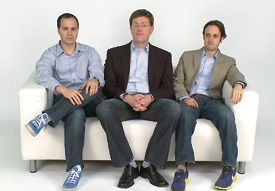First Up: Real person or spambot? Are You a Human can tell
Editor’s note: The following is an abbreviated version of a full feature found at innovate.umich.edu/innovator-profiles/are-you-a-human/.
Everyone who makes Internet transactions knows them — those irritating computer programs known as CAPTCHA that make users decipher squiggly letters in order to get to the Web content they want.
For many, the experience simply is a challenge of Internet life. For three co-founders of Are You a Human it was the inspiration for a new company that recently received first place in the student category of the statewide Accelerate Michigan Innovation Competition.
More online
• See a video and read more about Are You a Human >
• Learn about more U-M innovators >
Related stories:
Coleman leads U-M with innovative spirit >
University to host Obama’s Advanced Manufacturing Partnership meeting >
The fledgling business, now located in a downtown Detroit, with close to a dozen employees and contractors, is featured in a new communications campaign to tell the stories of innovation spawned at the university.
While still enrolled as students in the Stephen M. Ross School of Business, the Are You A Human team — Tyler Paxton, MBA 2011, CEO; Reid Tatoris, MBA 2011, chief operating officer; and Benjamin Blackmer, MBA 2012, chief marketing officer — came up with an idea to authenticate online transactions using a quick, easy game that requires the user to drag an object into a specific location. For example, the user may be asked to drag green stars into a blue box.
This simple task for a human is one designed to outsmart malicious bots that seek to intervene in such transactions in order to steal Web addresses and create spam campaigns, or to corner the market on an Internet sales opportunity.

Are You a Human, a firm created by Stephen M. Ross School of Business master’s students, has developed a better way for websites to verify that a user actually is a person, and not a spam bot. The company is led by (from left) CEO Tyler Paxton, CMO Benjamin Blackmer and COO Reid Tatoris. Photo by Michigan Productions.
“So we tried to think about, hey, how can we make this a much better experience for people but much harder experience for bots,” Paxton says.
Realizing that their program was not something companies would pay for—particularly since CAPTCHA is free — the team created a marketing focus for the product. A company that sells pizza, for example, could get a few seconds of advertising exposure as the user drags pepperoni onto a pie.
“This is a situation where a company gets 10 to 15 seconds of engagement with a customer. That’s worth paying for,” Tatoris says.
Paxton says Are You a Human tapped U-M’s innovation ecosystem all along the way.
The team credits the Zell Lurie Institute for Entrepreneurial Studies and the Center for Entrepreneurship in the College of Engineering for providing valuable guidance.
The founders participated in the Michigan Business Challenge, a competition sponsored by the ZLI. The coaching they received as part of that process helped them prepare for the Rice University Business Plan competition where they won $15,000 as overall second place winners, and an additional $100,000 Most Promising Technology Start-Up award. Next they secured an investment of $750,000 from a syndicate that included the Zell Lurie student-run Frankel Commercialization fund. The syndicate also was made up external venture capital firms, Detroit Venture Partners and First Step Fund, both based in Detroit.
The company also landed two ZLI Dare to Dream grants, and a Norman C. Harbert Summer Accelerator award from the U-M Center for Entrepreneurship, located in the College of Engineering. In addition, Are You a Human was selected to move into TechArb, U-M’s two-year old student accelerator, sponsored by the Center for Entrepreneurship and the Zell Lurie Institute.

